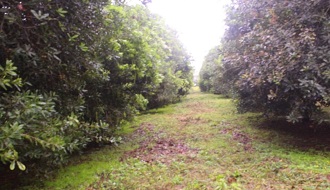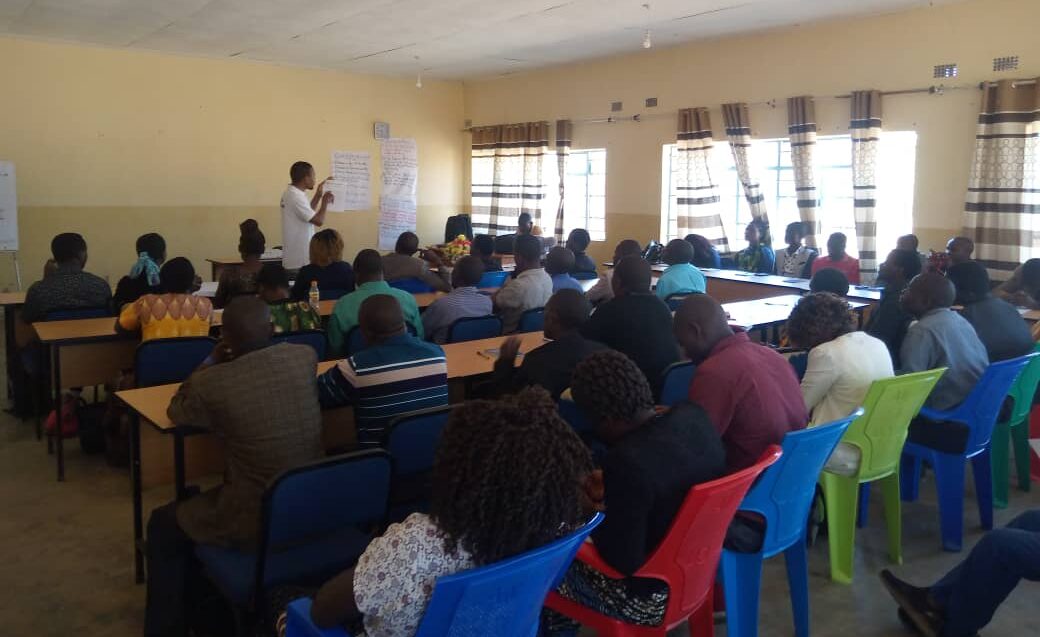607 HOUSEHOLDS BENEFIT FROM KARONGA DIOCESE FOOD CRISIS PROJECT
The Vicar General of the Diocese of Karonga, Monsignor Lorent Dziko, has reiterated the commitment of the Diocese to move beyond providing spiritual support to the people entrusted to her pastoral care by addressing their holistic needs as well.
The Vicar General made these remarks at Mwenelondo Health Centre on Wednesday when he presided over the launch of once-off cash transfers to 607 households who were affected by prolonged dry spells which hit Karonga District in 2023.
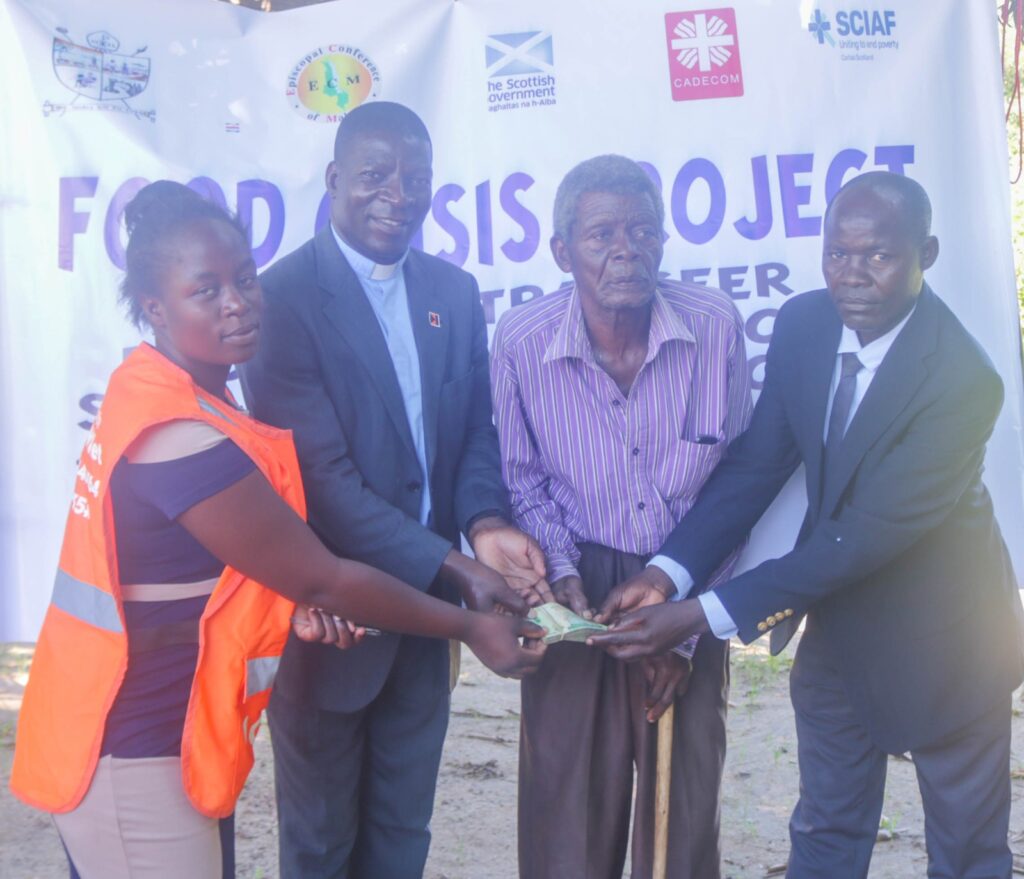
Each of the 607 beneficiary households received a consumption cash disbursement of One Hundred Thousand Malawi Kwacha (K100,000) through Mukuru mobile wallet transfers.
Speaking after receiving the money, one of the beneficiaries from Mwakisenjere Village in the area of Senior Chief Mwirang’ombe, Mable Mkandawire (37) appreciated the intervention stating that because of the dry spells, her family only managed to harvest two 50kg bags of maize from a 3-acre field. This she said was not enough to feed her family of 7 members. She said she will use the money to buy maize and foodstuffs for the family.
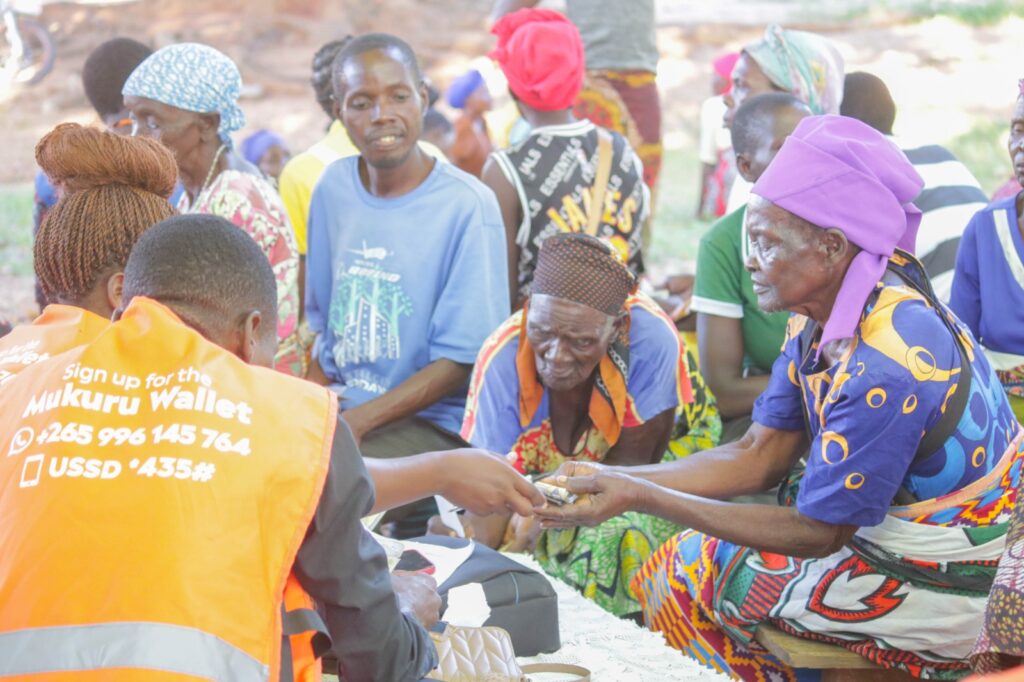
In his remarks, Precious Kumwenda, a member of the Karonga District Disaster Response Committee advised the beneficiaries to use the funds for the intended purpose.
Speaking on behalf of the Development Desk, Deodatus Muriya emphasized stressed the need for the community leaders not to interfere or influence the beneficiaries into misappropriation of the cash packages.
The cash transfers are a part of the Karonga Diocese Food Crisis Project which is a response to the 2023 drought that affected a lot of families within the diocese and being implemented with support from the Scottish Government and the Scottish Catholic International Aid Fund (SCIAF) through the Episcopal Conference of Malawi (ECM).
In the exercise, the Diocese of Karonga has distributed once-off cash assistance to 607 beneficiaries in the areas of Traditional Authorities Wasambo, Mwirang’ombe and Kyungu in Karonga District.
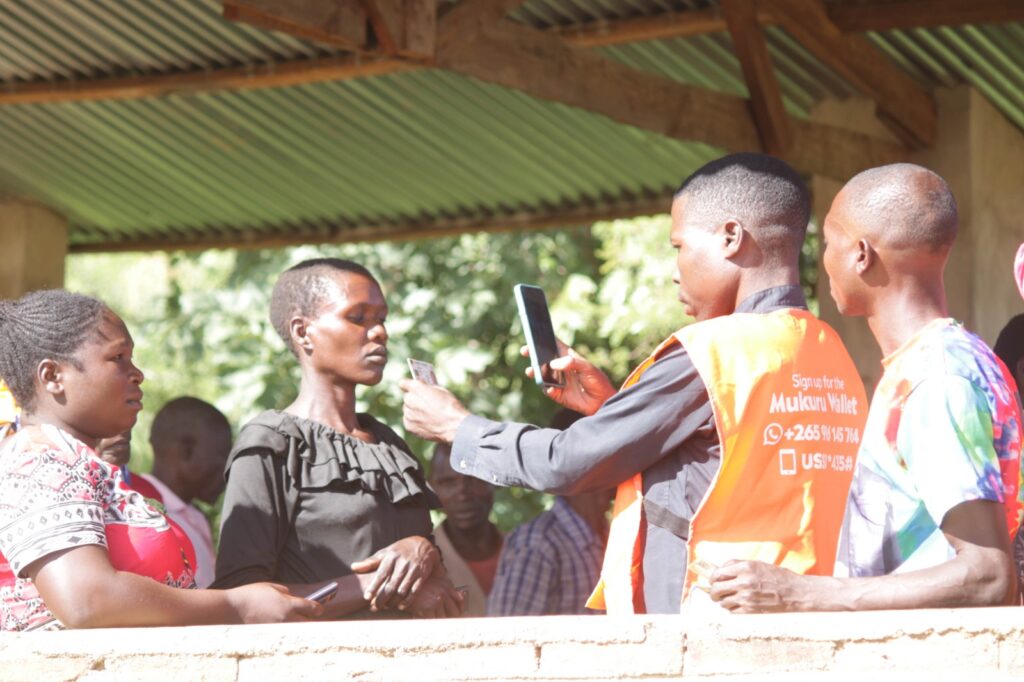
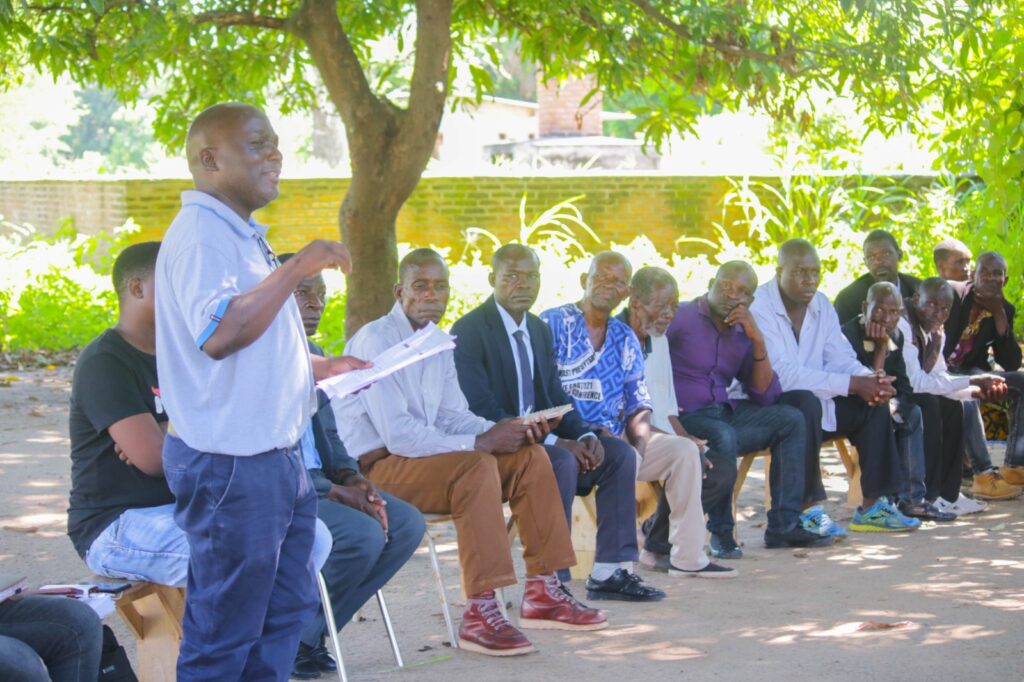
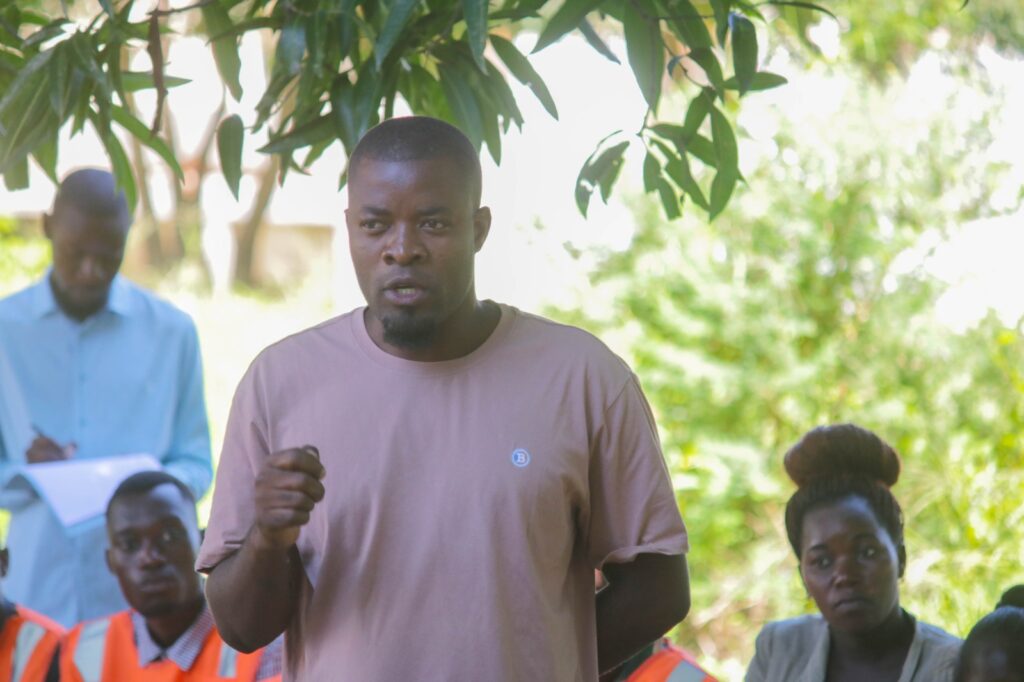
Nutritional Progress: Karonga Diocese’s Community Transformation Project Yields Positive Impact in Kopakopa”
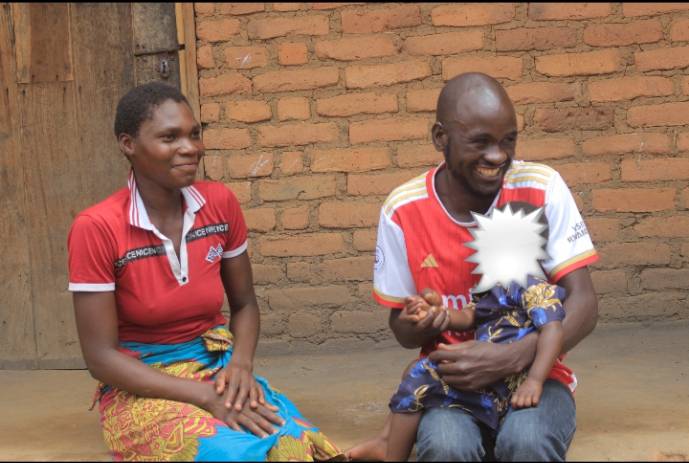
The Diocese of Karonga through the Community Transformation -CT project has expressed satisfaction over the impact the program of nutrition is bringing to members of Kopakopa community in Chitipa district.
According to Grace Kondowe the Nutrition Coordinator for the project; when the program was just rolled out the area had several cases of malnutrition but looking at the recent records there is a reduction to such cases, according to her, this is due to the collaboration with the volunteers for the program.
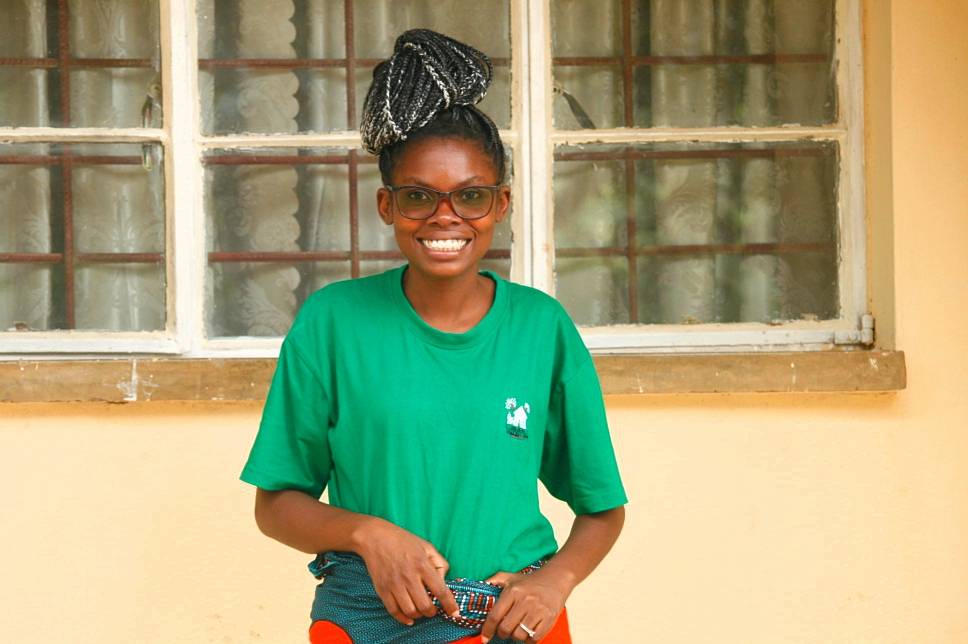
“It is so exciting to see how lives of people in the area of GVH Kopakopa are improving through good nutrition and hygiene practices. Before the introduction of program we had so many cases of malnutrition among children though we are not yet there but we have to reach out to all 110 households.” She said.
Kondowe further said she will not tire until the whole village has zero record of malnutrition.
Seeming to agree with Kondowe, Senior Health Surveillance Assistant for Mahowe Health Center Vincent Ng’ambi said, Kopakopa village had many cases of malnutrition of children but with the coming in of the program these cases are dwindling.
Speaking with one of the beneficiaries of the program Chifundo Ngwira said thanks to the program that his family now have knowledge on balanced diet meals and it’s importance in relation with malnutrition.
“I had everything in my house yet my child was looking unhealthy after learning through CT project that it was malnutrition me and my wife have known the right direction of alleviating the situation.” He said.
Meanwhile in a separate interview with GVH Kopakopa, he has expressed satisfaction with the development in his village saying people have truly embraced hygiene and the correct preparation of meals as such the CT project is playing a big role as far as improving healthy living is concerned in the area.
By Trifornia Mtawali.
A New Deacon and a New Priest: An Early New Year Gift to the Diocese Of Karonga
By Moses Raymond Kamanga
On Saturday, 30th of December, 2023 all roads led to St. Michaels Parish Chitipa for the ordination of Seminarian Raphael Simwera to Diaconate and Deacon Godwin Mwafongo to Priesthood. A multitude of Christians from Karonga, Misuku, Kamene and Nthalire braved the long distances and a scare of rains to travel and witness the young men saying “yes” to serve at the Lord’s Altar.
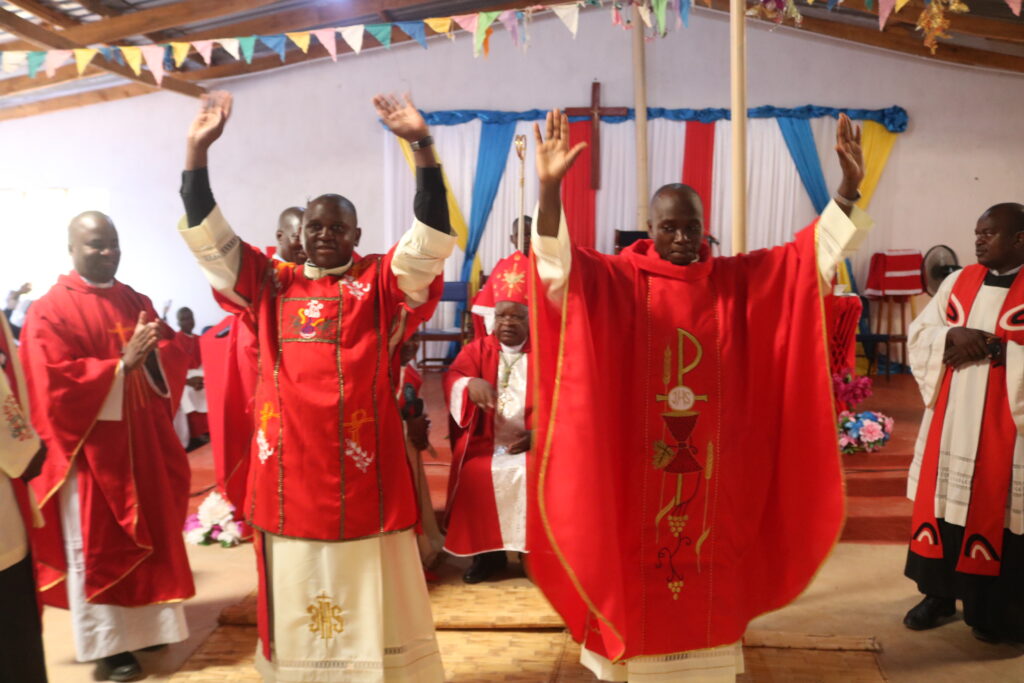
Instructing the two as they braced themselves to take up this noble responsibility, the Chief Shepherd of the Diocese of Karonga, Rt. Rev. Martin Anwel Mtumbuka advised them to persevere in their calling.
In his homily Bishop Mtumbuka asked the candidates to take after the Holy Family of Jesus, Mary and Joseph.
“We have just celebrated Christmas and there is a close link, which I want to share with you, between the experience of the Holy Family and priesthood. Joseph was depressed when he found out that Mary was pregnant and wanted to secretly leave her. Mary was troubled when Jesus went missing and found in the Temple. In these experiences, they endured,” explained Bishop Mtumbuka.
To these experiences, Bishop Mtumbuka connected priestly life in which the two candidates need to endure also.
“You should not be priests who just complain in everything. Complaining from Monday to Sunday, January to December; when there is nsima you complain, beans you complain, vegetables you complain, complaining about everything. I don’t want this,” expressed Bishop Mtumbuka.
He went on to encourage the two to commit themselves to the life of prayer, saying that prayer is the fuel for their priestly life.
“When prayer is abandoned in the life of a priest, signs and symptoms are very clear. Just as signs are conspicuously clear in a family whose couples no longer love each other.
You shall know this by the way they talk to each other and look at each other. A priest whose life is devoid of prayer does things haphazardly, with no commitment at all. May it not be so with you,” concluded Bishop Mtumbuka.
Deacon Raphael Simwera comes from St. Mathias Mulumba Parish in Misuku – Chitipa District and Fr. Godwin Mwafongo comes from St. Thomas Moore Parish – Malimbalimba in Karonga District. They both studied at Peramiho Major Seminary in Songea – Tanzania.
Deacon Simwera is set to be ordained a priest in August next year (2024) at St. Mathias Mulumba Parish Center in Misuku. Fr. Godwin Mwafongo has since been appointed to serve at St. Ignatius Parish in Nthalire and his ordination to priesthood has brought the number of diocesan priests in the Karonga Diocese to 24.
Empowering Communities: Karonga Diocese Donates Farm Inputs to Local Households
Diocese of Karonga through Community Transformation programme has lessened the worry of farmers in the area of Senior Traditional Authority Njikula in Rumphi by donating farm inputs to 99 households.
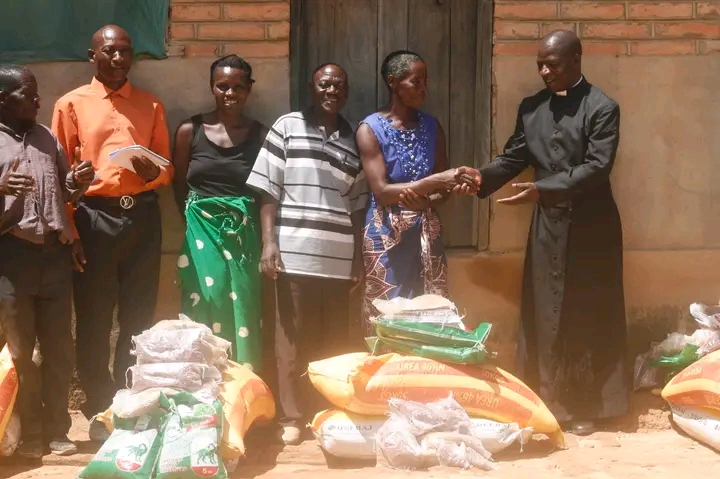
Speaking to Tuntufye FM, Karonga Diocese’s Vicar General Monsignor Laurent Dziko after the event on Friday 8th December 2023 said their aim is to see people from the area develop both physically and spiritually.
“As a a Catholic church just to be preaching the gospel to them is not enough we have also seen the need for us to help them to change in every area of their life as such providing these farm inputs was necessary so that when they plant and put into practice what our field officers teach them it will help them have bumper harvest “. He said.
He however, called on people to use the inputs accordingly so that the support rendered to them should yield positive results and change their lives for the better.
“Sometimes people think that just because they get something for free they can use the way they want which should not be the case because we have given these inputs with a purpose of changing their lives and if they put these inputs into good use it will surely change their lives”.
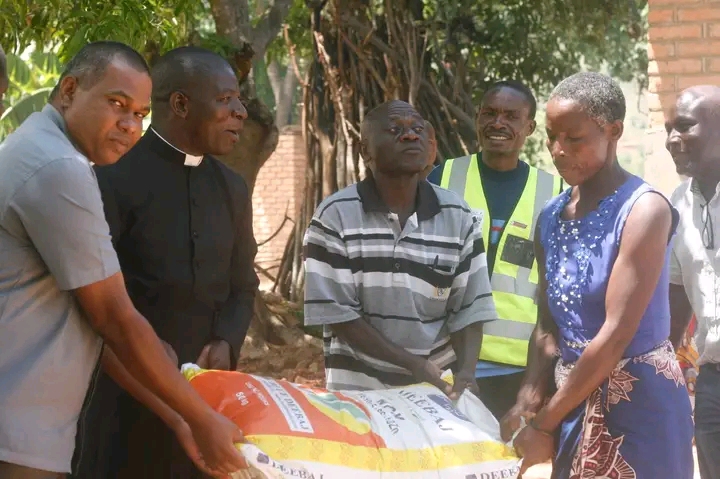
On his part is the Area Development Committee chairperson in the area Benson Matthews Maduna who asserts that he will make sure that the inputs given to the farmers are not misused and no one sells them through the aid of selected leaders who are to monitor these farmers.
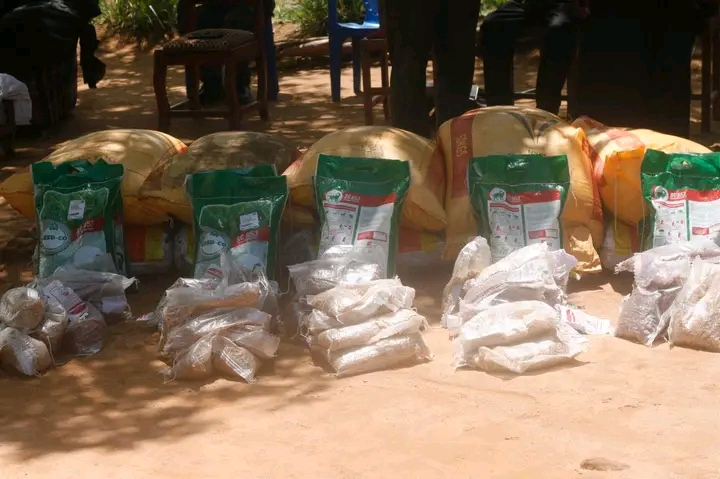
Meanwhile in a separate interview with one of the beneficiaries Elizabeth Mkandawire expressed gratitude to the diocese for changing her life through the project as she will not worry about food now because she will harvest a lot with the farm inputs she has received.
Other consignments of similar, farm inputs will also be distributed to farmers in the areas of Kopakopa in Chitipa and Chankholombe in Karonga districts.
By Trifornia Mtawali
KARONGA DIOCESE ORIENTS BOARDING MASTERS AND MISTRESSES ON SAFEGUARDING POLICY
By Wantwa Mwakasungula
As a way of creating a safer and conducive learning environment in Catholic schools under the Diocese of Karonga, Safeguarding Office of the Diocese has today oriented Boarding Masters and Mistresses on Safeguarding Policy with the aim of protecting students in these schools against harm in line with Catholic Social Teaching.
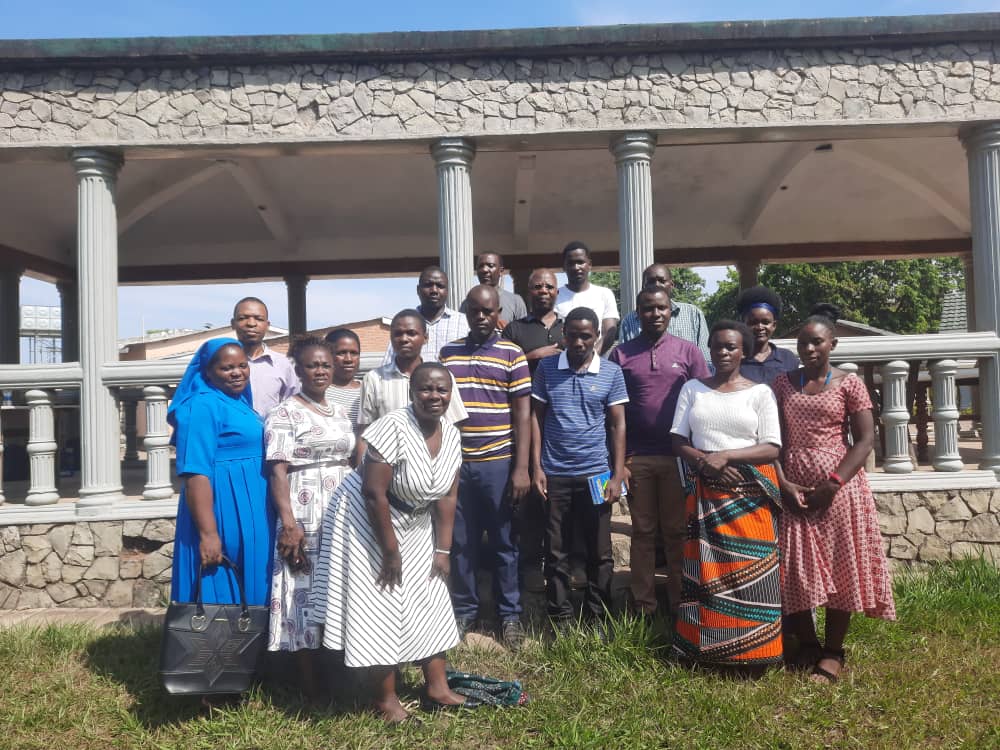
The Diocesan Safeguarding Officer, Vincent Bwinga said the training aimed at reminding these teachers and other officers working in these schools on the importance of the Safeguarding Policy which protects children and vulnerable adults.
Bwinga further encouraged teachers and workers who work within Catholic institutions to take part in making sure that people are being supported accordingly without any violation.
Speaking to Tuntufye FM Online, one of the Boarding Masters, from St Mary’s Karonga Girls Secondary School, Ronald Chiona said this training will help them to do their job in a safer environment as students will realize the reason why they are at school.
He added that students are subjected to several abuses which affect their performance at school, but with these trainings they will able to reduce such abuses.
These Boarding Masters and Mistresses came from all Catholic Secondary Schools in Karonga Diocese.
Karonga Diocese Receives 5 Hectares from Kopakopa for Community Transformation Project Efforts
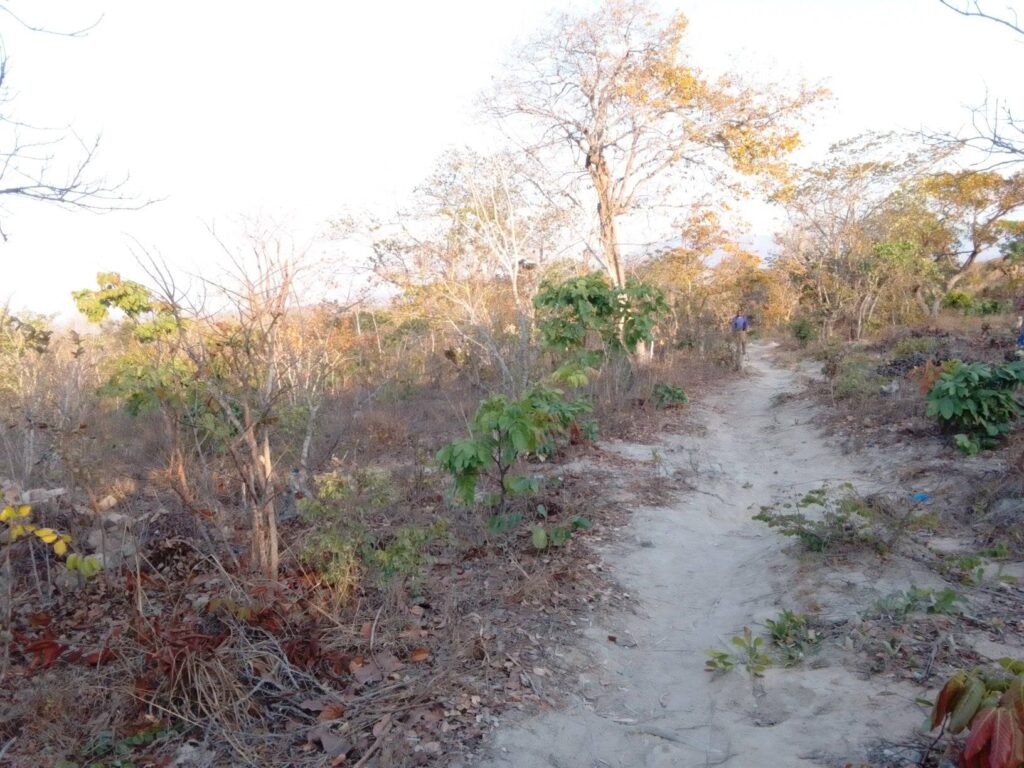
Karonga Diocese has been blessed with a donation of 5 hectares of land from people of GVH Kopakopa in appreciation for Community Transformation (CT) project which the Diocese is implementing in the area.
The GVH Kopakopa gave this land to the Diocese during the project’s monitoring tour on Thursday, 4 October, 2023.
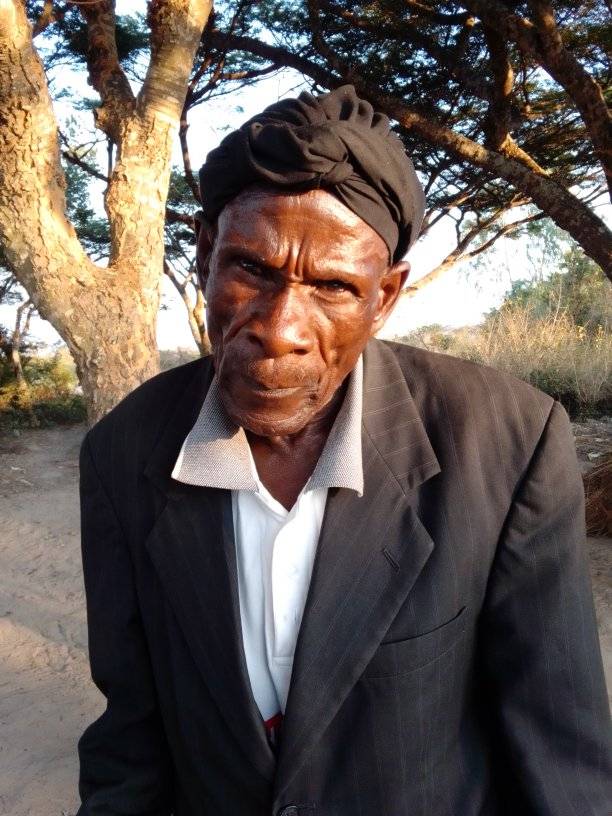
According to the GVH this land has been given to the diocese to assist with the project’s goal which is not only to provide good health, agriculture and education but also evangelization. As such this land has to be used to build a church in this area.
In a separate interview the Parish Priest for St Ignatius (Nthalire) Parish Father Atupele Kuyokwa said this is welcome development in the sense that people will not only develop socio-economically, but also grow spiritually.
“Appreciations should go to Cross Catholic Outreach for considering a spiritual evangelization component in this project because most organizations look down on the importance of prayer life. We are grateful to GVH Kopakopa for donating a piece of land to the Church,” he said.
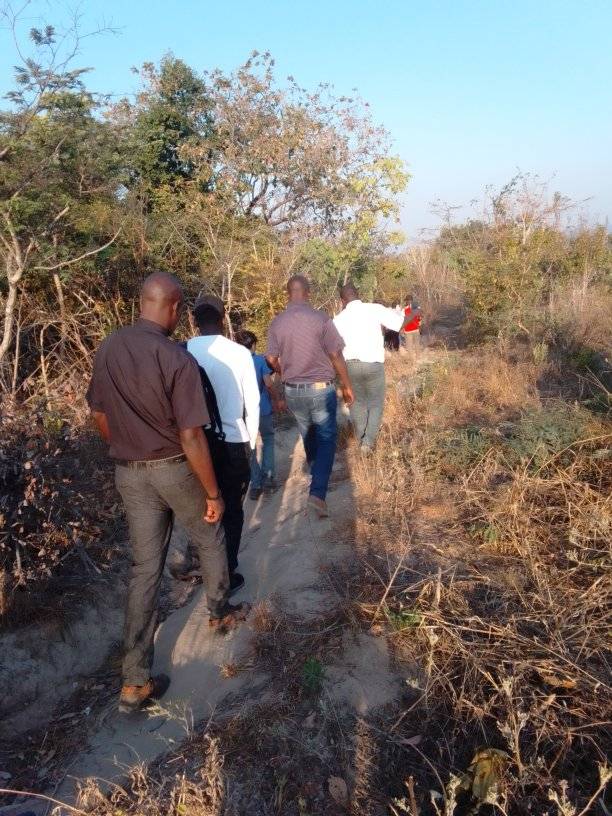
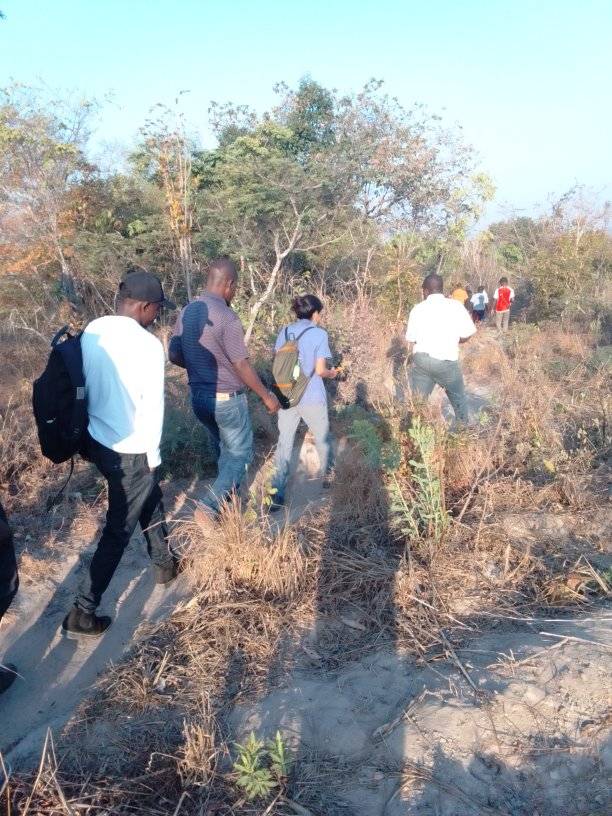
However, the Caritas Secretary Mwawi Shaba strongly encouraged all beneficiaries of this project to embrace the opportunity given by this project to end gender based violence and desist from accusing the elderly of practicing witchcraft because these actions will lead to the suspension of the project in this area.
By Trifornia Mtawali.
Tuntufye FM
Miracle Technical Institute Holds 20th Graduation Ceremony
By Ella Chirwa
The Deputy Director of Technical Vocational Education Training under the ministry of labour, Chifundo Lodzeni has applauded the management of Miracle Technical College for joining hands with government in attaining enabler number 5 in Malawi 2063.
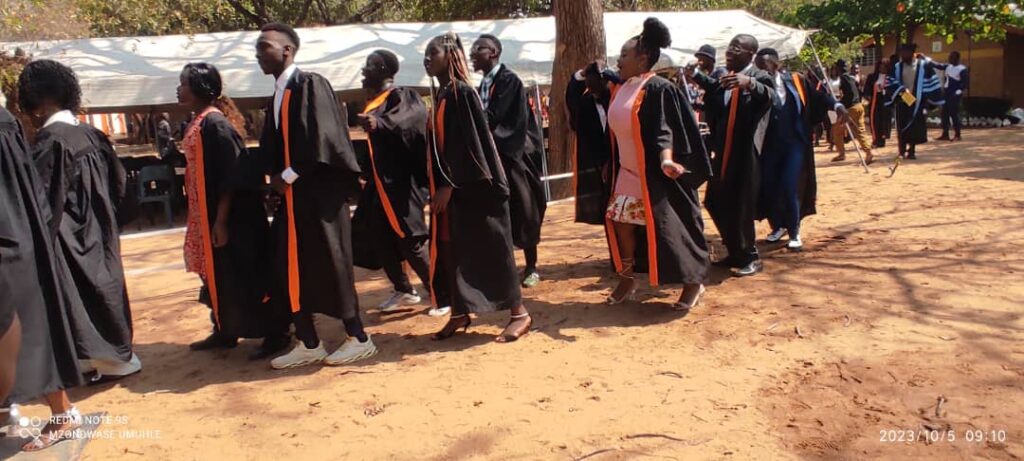
Lodzeni who was the guest of honour at the ceremony described the graduation as a symbol of relief to government as it is striving to achieve human capital development in making sure that young people are self-reliant.
“Young people account for 52% of the country’s population, and some are just idle. Seeing a number of youths acquiring different skills is a huge encouragement to the ministry as well as the country as a whole,” Lodzeni said.
Lodzeni further encouraged graduates to form groups of 10 or more and start different kinds of businesses so that they employ other youths who are just idle, rather than waiting for government to employ them.
Senior Training Programs Specialist for TEVETA, Tenis Molande has counselled graduates not to be eyeing white collar jobs rather use the skills they have gained to open up their own companies and assist in the development of the country.
The Principal for the College, Wanangwa Sichone has encouraged students to go into the labour market and showcase the skills they have gained in the 3 years stay at the school.
The student that managed to get a distinction in Electrical Installation, Levison Failosi, has encouraged youths who are idle to consider gaining vocational skills for their personal advancement.
In the 20th graduation ceremony, Miracle Technical Institute has awarded diplomas and certificates to 350 students (205 females and 145 males) who have successfully completed various formal and informal courses.
Charting the Course: Community Transformation-CT Project Progress Meeting
A meeting on the progress of the Community Transformation-CT project is underway at the curia offices in Karonga.
The purpose of this meeting is to plan for the three days tour for the project that is being implemented in three targeted districts, Chitipa, karonga and Rumphi.
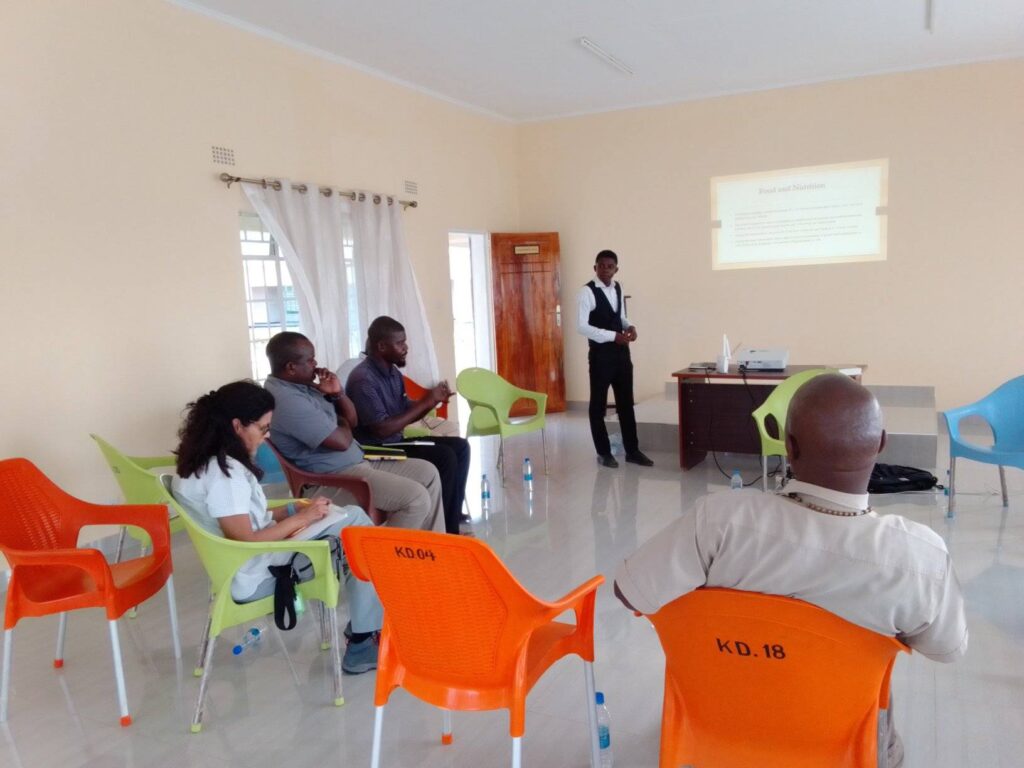
The meeting has been graced by the presence of the International project officer for Africa from Cross Catholic Outreach Tereza Camacho.
By Trifornia Mtawali.
The Eye of the Needle: Church Mission and Investment
*By Father Joseph Mkinga
In Luke 18:22, Jesus tells a wealthy young man to ‘sell all that you own and distribute the money to the poor.’ Jesus goes on to say, ‘it is easier for a camel to go through the eye of a needle than for a rich man to enter the Kingdom of God.’ When we look at both scripture and tradition, we find Christians wrestling with how to apply the teachings of Jesus and how to care for the poor. It is very clear that even among early Christians, the Acts of the Apostles and Pauline Churches, the teaching of renunciation of wealth never took root. However, there was a serious commitment to address the gap between the poor and the rich in their communities.
The motto of Karonga Diocese is ‘We shall go to them’. This motto is at the center of the nature of the Church as a mission. God’s plan of salvation is meant for all peoples and all nations (Mt 28:19). That’s what we see happening after Pentecost, Christ’s disciples go out to spread the Gospel. Evangelism, belongs to the very nature of the Church. There is no sharing in Christ without sharing in his mission. This focus on Christ’s mission of going to all peoples has a number of consequences for the missionary church. Echoing the words of Late Bishop Zuza of Mzuzu, ‘Nyengo yakwana’ (It is time) for the local church to support its own mission.
In order to reach out and touch everyone with the message of Christ within and beyond the diocese, Karonga Diocese requires enormous resources to fulfill the implications of its mission. To reduce overdependence on external financial assistance in support of its missionary initiatives enshrined in the motto; ‘we shall go to them’. The Diocese of Karonga embarked an investment drive through agribusinesses ventures. Among the initiatives is Chipunga Farms Limited; an agribusiness outfit that specializes in coffee and macadamia plantations.
The Diocese of Karonga acquired Chipunga Farms Limited in January, 2018. Chipunga Farms Limited is a limited liability company and to date, comprises of three farms namely; Mughese Coffee Farm at Misuku in Chitipa District, Chiwela Farm in Rumphi District and the main farm Chipunga Farm. Chipunga Farm has 286.46 hectares (ha) of land of which 160.0 ha is earmarked for coffee and macadamia plantations in the next 5 years. The farm is located in Chikwina, Nkhata-Bay District in Traditional Authority Mnyaluanga. It is 25 kilometres to the North East of Mzuzu City. The Farm has 37.0 ha of land planted with coffee in three stages, the older one is 5 years and is in its third harvest in 2023, the medium is 3-year-old and the other one is 1 years old. In addition to coffee, the farm has also 31.0 ha of macadamia, of which 18.79 ha is productive and 12.21ha of macadamia is 3 years old.
We have arrived at a critical juncture in our life together. We cannot deny the fact that life has changed a lot more than we envisaged. We are at a point where only the most adaptive to change survive (Charles Darwin). In as much as the Church wishes to spread the gospel, there is no denial of the role of money in fulfilling the church mission. We cannot cast a blind eye on the fact that external support is diminishing at a fast rate than we could wish.
While there has been considerable discernment about the best way of deploying our meagre financial resources collected from the faithful, we must recognize the sad reality before us. The Church does in fact require more financial assistance to pay salaries, maintain property, build churches, schools, hospitals and support all other institutions of evangelization including the radio station. At the same time, our reading of the signs of the times, has led us to understand that in addition to the many ministry projects that the diocese undertakes, our investment strategy and approach should be informed by our sense of vocation and call. St Paul, the Apostles, reminds us in Acts 18:1-4, that he made tents, in order to earn money to support himself in his real ministry of witnessing to Christ. It is certainly true that Paul wants to support himself. Yet his intention was not only to support himself in his preaching ministry, but also to provide financial support to the needy.
When Paul describes his economic impact among the Ephesians, he says: I coveted no ones’ silver or gold or apparel. You yourselves know that these hands ministered to my necessities, and to those who were with me, in all things I have shown you that by so toiling one must help the weak,remembering the words of Jesus Christ, how he said, ‘It is more blessed to give than to receive.’ (Acts 20:33-35).
Paul’s money earning work was an effort to build up the community. He sets an example for everyone to follow in enhancing the common good and support of the weak. This gives the basis for the diocese of Karonga to toil in order to help the weak and to support the mission. Tent making has become a common metaphor for the church to engage in a money-earning enterprise as means to support church mission. It is thus very clear that money-earning is for the building of the Kingdom of God. As such, the question is how moral is the enterprise that raises these funds. And of what benefit are the funds towards the common good.
Christian life has been marked by considered concern for the poor, a principle that bears witness to God’s goodness. From the days of Jesus Christ to the early church described in Luke-Acts, a wrestling with how to deploy financial resources for the common good has ensued. We find in the writings of early theologians like Clement of Alexander and St Augustine of Christians believing in a just society where resources are shared with those in need (The Epistle to Diognetus).
Though one cannot determine a precise starting point for socially responsible investing, there are elements of such conscientious practices in Christian tradition reminding us that humanity should use money for building the Kingdom of God, and not to exploit others. Otherwise, riches without a responsible social concern can yield worse outcomes and capitalist culture. Thus, it is easier for a camel to pass through the eye of a needle than for the rich to enter the Kingdom of Heaven if the money-earning enterprise is deprived of ethics. That is, if riches are not used for common good and for the building of the Kingdom of God.
The early church was intensely interested in the common good- in creating communities that ensured peoples essential needs were provided for. The leaders of the early church knew that they could never achieve such a reality without the spiritual and moral transformation of those who had the resources. They knew that they could never provide essential needs if the people saw their enterprise as singularly their own. Instead, the enterprises had the capacity to be used for the ministry to benefit both owners and those who had a need. And this ultimately, is the point I would like to leave you with. That one of the great spiritual transformations of Karonga Diocese is how people think about money. That the Diocese approaches money with intention and conviction about its purpose in spreading the Gospel and building the Kingdom of God.
In investing, Karonga Diocese, does not depart from traditional Christian teaching. It is merely embracing what has been traditionally and biblically taught. That by …going to them, it is our purpose and calling to minister to others using our spiritual gifts and financial resources ethically, mindfully and creatively. Only then could our riches help us lead us to heaven.
*The author, Rev. Fr. Joseph Mkinga, Acting General Manager for Chipunga Farms Limited
Justice and Peace Desk Trains Safeguarding Focal Persons
By Janet Mhango
From the 14th to the 15th of September, CCJP has trained the Safeguarding Focal Persons on safeguarding, case management, and referral. The training brought about 54 Safeguarding Focal Persons from 25 Catholic Primary Schools and 4 Catholic Secondary Schools in Chitipa District.
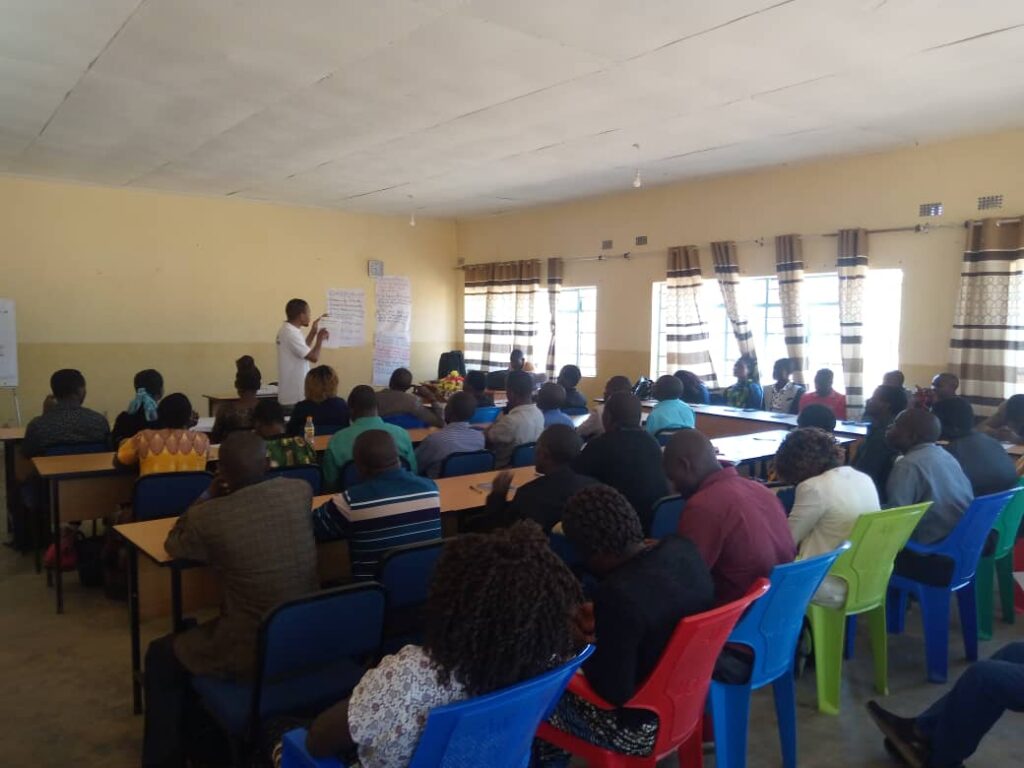
Through the training, CCJP has equipped these Safeguarding Focal persons with more skills to handle both reported and non-reported cases of abuse, creating a safe environment for students and contributing towards protecting the rights of children in respective schools.
This training was conducted because of the strong view that most issues regarding abuses in schools are swept under the carpet. Cases of abuse are barely reported. In addition, although the Diocese of Karonga established Safeguarding Focal Persons in all its institutions, they had implementation and enforcement gaps that needed them to be filled, hence the trained.
The Justice and Peace Desk of the Diocese of Karonga, with Funding from Misereor, is implementing a project in Chitipa District called “Gender Sensibilization and Safeguarding in the Diocese of Karonga.”
One of the objectives of the project is that Catholic Primary Schools have established systems for the protection of students. To achieve this objective, the project works with Safeguarding Focal Persons which are structures established by the Diocese of Karonga to handle safeguarding concerns and reported cases of abuse.

